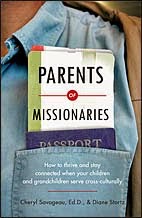 Early on in their book Parents of Missionaries, Cheryl Savageau and Diane Stortz address the topic of disenfranchised grief. Not only is unaccepted grief an issue for cross-cultural workers when they return but also for those they leave behind when they go to serve.
Early on in their book Parents of Missionaries, Cheryl Savageau and Diane Stortz address the topic of disenfranchised grief. Not only is unaccepted grief an issue for cross-cultural workers when they return but also for those they leave behind when they go to serve.
The authors write that disenfranchised grief “results when we deny or condemn our feelings or believe God doesn’t care about our pain. It also occurs when others criticize our feelings or consider us too strong to need support.”
Grief for the parents of missionaries (POMs) should not be minimized or ignored, nor should parents feel guilty for this normal emotion. It is very real, as is the loss that is experienced. For some it is a loss of physical or emotional closeness to their children and grandchildren. For some it is a loss of dreams for the family. For some it is a loss of confidence in discerning God’s will.
At times the grief can feel overwhelming. One mother quoted in Parents of Missionaries says, “My prayers turned from asking God to keep you safe and bless you . . . to please take my life away because surely I was not created to live with pain that . . . hurts more than childbirth.”
As I was making my way through Savageau and Stortz’s great book on this often neglected part of the missionary team—parents—I focused on this topic of disenfranchised grief, making note of instances where healthy grieving over the absence of missionary children was stifled. Following are those examples, quoted directly from Parents of Missionaries. Each one is followed by its page number, in part to demonstrate how they show up throughout the work.
I hope this list will be an encouragement to POMs who are grieving, letting them know they are not alone. I hope it will also help us all be better companions in grief to those who are letting their children go without letting go of them. May we not repeat these discouraging words or represent these unhealthy attitudes, to others or to ourselves:
[One mother] experienced profound self-doubt and feared others would take a critical view if they knew of her inner struggle. She believed having an adult child enter missions would not upset a real Christian. (24)
One workshop attendee asked, “What’s the big deal? It’s not like they’re dead,” while another said, “Having a child enter missions isn’t as bad as having a child outside the faith.” A few missions-minded people have . . . argued that only joy should abound when young people choose a career in missions. (28)
[Some] have honestly asked how POM grief differs from whining. (28)
“We’re not supposed to have needs of our own since we’re in the ministry.” (32)
Men often mask their grief. They typically cope with conscious grief privately, downplay their feelings, intellectualize about loss, and focus on solving loss-related problems. (34)
Our culture’s lack of patience with grief causes many of us to feel ashamed of our feelings and hide our grief. (35)
The assertion that “I can do all things through Him who strengthens me” (Philippians 4:13) does not qualify as a rationale for running away from our feelings. (80)
“I feel like a whiner and complainer after typing up what I wrote in my journal. Maybe you can use it as a bad example of a missionary mom.” (94)
“I miss [my daughter] more than ever before—and I feel really guilty about it.” (94)
“I know I should be excited and thankful that my daughter and her husband will leave for the mission field in August, but I’m having a hard time with my emotions!” (120)
Other POMs who cry easily are not as willing to be seen as vulnerable. One missionary observed about his mom, “Talk of kids, vacation, future plans, how long before we see you again can make her cry instantly. We pretty much can’t talk to her about anything. That was her request, and my dad’s. I think it’s not healthy, and she agrees.” (130)
We sometimes erroneously assume everyone else feels happy amid the holiday bustle and blame ourselves for feeling down or blame others for stealing our joy. Our culture conditions us to expect happiness during the holidays, making normal life problems (that don’t magically disappear on command) seem particularly hard to accept on festive occasions. (216)
Some POMs hesitate to cast their cares upon God because they feel ashamed of their own emotions. This keeps them from enjoying the relief and freedom He wants to offer. (262)
Of course, Parents of Missionaries isn’t just about grief. In fact, Savageau and Stortz write that the need for parent’s to grieve is “only half the story”:
You need to both grieve and change what you can in your life. Make decisions that move you toward fullness of life even though your missionary lives far away. What does God want to do with the rest of your life? . . . If you’re a POM, please look in the mirror and see yourself through our eyes as someone who has made a blessed sacrifice for the kingdom and someone God wants to use in unforeseen ways in days to come. You struggle because you love. Accept your feelings. Ask for and accept help. . . . And do all you can to help yourself.
So if you are a POM, read the whole book to learn how to better understand your loss and grief, how to seek out and receive help, from God and from others, and how to be the best support and teammate for your family members overseas. There can be joy even in the midst of grieving.
(Cheryl Savageau and Diane Stortz, Parents of Missionaries: How to Thrive and Stay Connected when Your Children and Grandchildren Serve Cross-Culturally, Downers Grove, IL: InterVarsity, 2008)
